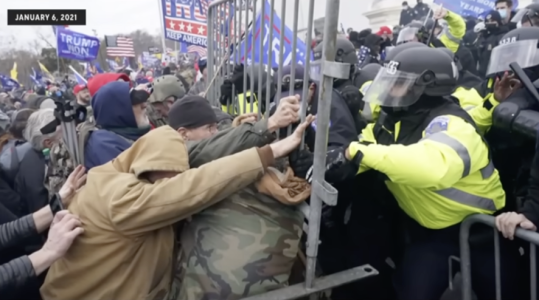5,000 FBI agents’ details handed to Trump’s team–Here's why they’re suing now.
- Replies 3
In a move that has sent shockwaves through the corridors of the Federal Bureau of Investigation (FBI), the personal details of 5,000 employees who worked on cases related to the January 6, 2021, Capitol riot have been turned over to the Trump Justice Department.
This unprecedented action has raised alarms about the potential for political retribution and has led to a lawsuit by FBI agents against the Justice Department.
Here at The GrayVine, we understand the gravity of this situation and are here to unpack the implications for our readers and the broader American public.
The FBI's compliance with the Justice Department's demands has been met with trepidation among its ranks.
The concern is palpable–agents fear that the Trump administration may use this information to compile a list of personnel for potential dismissal.
The details provided include employee ID numbers, job titles, and roles in the January 6 US Capitol riot investigations, though names were not included.
The situation escalated when Acting Deputy Attorney General Emil Bove issued a memo titled “Terminations,” setting a tight deadline of 12PM on Tuesday for the FBI to submit thousands of details of agents and analysts.

Bove followed the firing of eight senior FBI officials, such as those who supervised cyber, national security, and criminal investigations.
Over 5,000 employee details were submitted among a total of more than 13,000 agents and 38,000 total FBI employees.
On the other hand, officials dispatched by Elon Musk have been spotted at the FBI headquarters. Musk has spearheaded efforts by President Trump’s newly created Department of Government Efficiency, or DOGE.
In response to these developments, several FBI employees have taken legal action, filing a lawsuit that accuses the Justice Department of violating constitutional and privacy rights.
The agents' lawsuit seeks to block the administration from publishing or using the information gathered from a survey that they argue is designed to “purge” bureau personnel.
“The very act of compiling lists of persons who worked on matters that upset Donald Trump is retaliatory in nature, intended to intimidate FBI agents and other personnel, and to discourage them from reporting any future malfeasance and by Donald Trump and his agents,” the lawsuit claims.
The survey in question asked agents about their involvement in the January 6 investigations, including whether they executed arrests or testified at trials.
The lawsuit, filed as a class-action complaint by anonymous FBI employees, claims that compiling lists of those who worked on cases that angered Donald Trump is an act of intimidation and retaliation.
Also read: Everything you need to know about Kash Patel: Trump’s pick for leading the FBI
The FBI's workforce, which generally leans conservative, has been caught off guard by these attempts to penalize agents for working on assigned cases.
The focus on firing anyone involved in Trump-related investigations has been slowed due to the pushback from agents, such as some who are working with the new administration to create cultural changes at the FI headquarters. These changes are initiated by Kash Patel, Trump’s chosen FBI director.
Groups that represent current and previous agents have communicated with congressional Republicans to persuade the White House to comply with Patel’s promise in Senate that agents won’t experience political retribution for working on the cases they were tasked with.
Patel also mentioned that there would be a process to review the work of agents.
Source: CBS News / Youtube.
In a Friday memo, Bove outlined a review process following the dismissal of eight senior officials, aligning with details from Patel’s testimony. The memo stated that the Deputy Attorney General’s office would assess whether further personnel actions were needed.
FBI employees, already anticipating significant changes after Trump’s election, were caught off guard by efforts to penalize agents and analysts who have no control over their case assignments.
Last month, over a dozen officials involved in federal investigations into Trump were fired. Acting Attorney General James McHenry cited a lack of trust in their ability to implement Trump’s agenda.
While the FBI workforce tends to lean conservative, many agents expressed discomfort with handling Capitol riot cases after January 6, criticizing the heavy-handed response.
Trump’s pardon of riot participants on his first day in office further complicated matters. Some agents have also voiced concerns about the growing management ranks at FBI headquarters and the focus on Washington-based cases.
However, the broader purge has alarmed even those critical of FBI leadership. On Monday, advocacy groups representing federal law enforcement urged Congress to block the Trump administration from removing career FBI officials.
The head of the FBI’s New York office vowed to protect his team, while the FBI Agents Association advised members not to resign, emphasizing that any removals should not be voluntary.
Lawyers for prosecutors and FBI agents warned that dismissing employees involved in Trump-related investigations would violate due process rights and threatened legal action.
Source: FOX 10 Phoenix.
They also highlighted the risks of doxxing, swatting, and harassment if the identities of terminated employees were made public.
The chief judge of DC’s federal trial court allowed anonymous public employees to proceed with lawsuits against the Trump administration using pseudonyms.
Chief Judge James Boasberg cited concerns about harassment and threats, particularly for FBI agents involved in Trump-related investigations. He noted instances of agents being doxxed or attacked online, as well as efforts by January 6 rioters to expose their identities.
In the FBI cases, plaintiffs’ names will be shared confidentially with the Justice Department, but OPM staffers can withhold their identities from government defendants due to potential professional repercussions.
The OPM case alleges failures in assessing data security issues for an email system used across the federal civil service.
The three cases will now be assigned to judges, who may revisit the anonymity rulings.

What are your thoughts on this issue? Share your insights in the comments below, but please remember to remain respectful.
This unprecedented action has raised alarms about the potential for political retribution and has led to a lawsuit by FBI agents against the Justice Department.
Here at The GrayVine, we understand the gravity of this situation and are here to unpack the implications for our readers and the broader American public.
The FBI's compliance with the Justice Department's demands has been met with trepidation among its ranks.
The concern is palpable–agents fear that the Trump administration may use this information to compile a list of personnel for potential dismissal.
The details provided include employee ID numbers, job titles, and roles in the January 6 US Capitol riot investigations, though names were not included.
The situation escalated when Acting Deputy Attorney General Emil Bove issued a memo titled “Terminations,” setting a tight deadline of 12PM on Tuesday for the FBI to submit thousands of details of agents and analysts.

FBI officials have complied with demands to submit details of employees who worked on January 6 investigations to the Trump Justice Department. Image source: CBS News / Youtube.
Bove followed the firing of eight senior FBI officials, such as those who supervised cyber, national security, and criminal investigations.
Over 5,000 employee details were submitted among a total of more than 13,000 agents and 38,000 total FBI employees.
On the other hand, officials dispatched by Elon Musk have been spotted at the FBI headquarters. Musk has spearheaded efforts by President Trump’s newly created Department of Government Efficiency, or DOGE.
In response to these developments, several FBI employees have taken legal action, filing a lawsuit that accuses the Justice Department of violating constitutional and privacy rights.
The agents' lawsuit seeks to block the administration from publishing or using the information gathered from a survey that they argue is designed to “purge” bureau personnel.
“The very act of compiling lists of persons who worked on matters that upset Donald Trump is retaliatory in nature, intended to intimidate FBI agents and other personnel, and to discourage them from reporting any future malfeasance and by Donald Trump and his agents,” the lawsuit claims.
The survey in question asked agents about their involvement in the January 6 investigations, including whether they executed arrests or testified at trials.
The lawsuit, filed as a class-action complaint by anonymous FBI employees, claims that compiling lists of those who worked on cases that angered Donald Trump is an act of intimidation and retaliation.
Also read: Everything you need to know about Kash Patel: Trump’s pick for leading the FBI
The FBI's workforce, which generally leans conservative, has been caught off guard by these attempts to penalize agents for working on assigned cases.
The focus on firing anyone involved in Trump-related investigations has been slowed due to the pushback from agents, such as some who are working with the new administration to create cultural changes at the FI headquarters. These changes are initiated by Kash Patel, Trump’s chosen FBI director.
Groups that represent current and previous agents have communicated with congressional Republicans to persuade the White House to comply with Patel’s promise in Senate that agents won’t experience political retribution for working on the cases they were tasked with.
Patel also mentioned that there would be a process to review the work of agents.
Source: CBS News / Youtube.
In a Friday memo, Bove outlined a review process following the dismissal of eight senior officials, aligning with details from Patel’s testimony. The memo stated that the Deputy Attorney General’s office would assess whether further personnel actions were needed.
FBI employees, already anticipating significant changes after Trump’s election, were caught off guard by efforts to penalize agents and analysts who have no control over their case assignments.
Last month, over a dozen officials involved in federal investigations into Trump were fired. Acting Attorney General James McHenry cited a lack of trust in their ability to implement Trump’s agenda.
While the FBI workforce tends to lean conservative, many agents expressed discomfort with handling Capitol riot cases after January 6, criticizing the heavy-handed response.
Trump’s pardon of riot participants on his first day in office further complicated matters. Some agents have also voiced concerns about the growing management ranks at FBI headquarters and the focus on Washington-based cases.
However, the broader purge has alarmed even those critical of FBI leadership. On Monday, advocacy groups representing federal law enforcement urged Congress to block the Trump administration from removing career FBI officials.
The head of the FBI’s New York office vowed to protect his team, while the FBI Agents Association advised members not to resign, emphasizing that any removals should not be voluntary.
Lawyers for prosecutors and FBI agents warned that dismissing employees involved in Trump-related investigations would violate due process rights and threatened legal action.
Source: FOX 10 Phoenix.
They also highlighted the risks of doxxing, swatting, and harassment if the identities of terminated employees were made public.
The chief judge of DC’s federal trial court allowed anonymous public employees to proceed with lawsuits against the Trump administration using pseudonyms.
Chief Judge James Boasberg cited concerns about harassment and threats, particularly for FBI agents involved in Trump-related investigations. He noted instances of agents being doxxed or attacked online, as well as efforts by January 6 rioters to expose their identities.
In the FBI cases, plaintiffs’ names will be shared confidentially with the Justice Department, but OPM staffers can withhold their identities from government defendants due to potential professional repercussions.
The OPM case alleges failures in assessing data security issues for an email system used across the federal civil service.
The three cases will now be assigned to judges, who may revisit the anonymity rulings.
Key Takeaways
- FBI officials have complied with demands to submit details of employees who worked on January 6 investigations to the Trump Justice Department.
- FBI employees are concerned the information will be used to amass a list for potential termination, and several have sued the Justice Department alleging the effort is to "purge" bureau personnel.
- The Trump administration has already fired more than a dozen officials involved in federal investigations into Trump, raising concerns of political retribution.
- The chief judge of DC’s federal trial court has allowed FBI employees to proceed with lawsuits against the Justice Department using pseudonyms due to risks of harassment and threats.
What are your thoughts on this issue? Share your insights in the comments below, but please remember to remain respectful.
Last edited:






